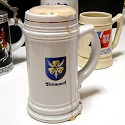
Commander in Chief of the Kriegsmarine Conference Minutes of the Commander in Chief, Navy, at the Führer Headquarters on 24 September 1943.
A1. The Commander in Chief, Navy, was present when Field Marshal Baron von Weichs reported to the Führer on the situation in the Southeast and recommended the timely evacuation of our outposts on the islands in the Aegean Sea, including Crete. The Commander in Chief, Navy, had intended to make the same proposal, motivated by the following considerations: a. The next strategic moves of the enemy are evidently directed against the Balkans. It is possible that the start of the contemplated operation has been delayed by the German success at Salerno. However, it would be a mistake to conclude from this that the action directed against the Balkans has been given up. b. Our own position in Greece and the neighboring areas of the Adriatic and the Aegean Sea is very precarious. Our forces on the peninsula are kept busy with the suppression of partisan activities and are hardly in a position to prevent a landing attempt in force. The naval forces assigned to coastal defense are likewise not of sufficient strength to prevent such a landing; they do not possess any fighting strength to speak of, except in the Aegean area. c. At sea, we have only small vessels which are without military value once the enemy decides to bring his superior naval forces into play. d. The enemy's air superiority in the whole area is undisputed. e. The bases on the islands, in particular on Crete, were established at a time when we were still planning offensive operations in the eastern Mediterranean area. Meanwhile, the situation has changed completely. The Italian Armed Forces no longer exist. Our position on the Balkan Peninsula is in danger for lack of sufficient forces; maintenance of security in Balkan rear areas has become a difficult task. The advanced island bases are of no value in a defensive situation such as this, since the enemy will by-pass them and force their surrender, sooner or later, by cutting off their supplies. Thus we shall lose, without a compensating strategic advantage, irreplaceable troops and materiel which could be of decisive importance for defense of the Continent. f. A quick decision is imperative because:
2. the scarcity of shipping space and the weakness of the protective forces at our disposal will make this a relatively slow affair. A2. The Commander in Chief, Navy, took the opportunity to present to the Führer his opinion in regard to the present situation in Italy: From a military standpoint, it is clear that Sicily and Southern Italy are especially important for the enemy as a bridge to the Balkans. Therefore it is necessary for us to do all in our power to block this route as long as possible. From this point of view Sicily should have been held to the very end. Strategically it was worth every sacrifice. Now another opportunity for determined resistance presents itself in Apulia. To prepare, follow through, and secure a beachhead for a possible assault on the Balkans, the enemy needs the airports near Foggia. This was the pattern followed in Sicily and Salerno. If these airfields remain in our hands, the attack on the Balkans will be effectively delayed. The Führer agrees with the Commander in Chief, Navy, and will issue directives for the conduct of the war in Italy accordingly. A3. The Commander in Chief, Navy, presented an extensive report on the successful submarine campaign in the North Atlantic. In this connection, the Führer pointed with unprecedented emphasis to the importance of submarine warfare against shipping which is the only bright spot at present in an otherwise dark war situation. Submarine warfare must therefore be stepped up by all available means. A4. The Commander in Chief, Navy, then reported on the attack on the Tirpitz by British midget submarines on 22 September and used charts to explain what protective measures had been taken previously. The Führer agreed that the battleship should not he taken to a German shipyard for repairs. In this decision he is guided by vital interests of submarine warfare, as set forth by the Commander in Chief, Navy. (see War Diary, 25 September) B1. The Commander in Chief, Navy, contacted the Chief of the General Staff, Luftwaffe, General Korten, concerning information originating with H L 1 "Technical Planning" which he had received from the Seekriegsleitung, Operations Division. According to this information, the production and output of the Heinkel 177 was reduced for a limited time in favor of an increased output of fighter planes. In order to achieve an additional output of 700 fighter planes, the production goal of 100 Heinkel 177 a month, which was to be reached by November, has been deferred to the beginning of January. General Korten answered:
b. that there could be no question of using Heinkel factories for the manufacture of fighter and bombing planes.
countersigned: Korvettenkapitän Mejer
|
 BOOK: The Battleship Bismarck. The Complete History of the Ship.
 Naval & military gifts
|
